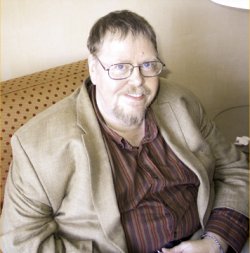Excerpts from the interview:
“I try to hold the line in the distinction between science fiction and everything else when I edit The Year's Best Science Fiction series. That distinction doesn't mean a whole lot to some people anymore, but I have this naive feeling that if it says 'The Year's Best Science Fiction' on the cover it should (mostly at least) have science fiction in it. It is old-fashioned. Although SF is leaking into mainstream fiction and mainstream is leaking back, you can still tell whether or not something is core science fiction, if you care to make that distinction in the first place.
 “For the Year's Best I try to keep the stuff that's too much over the borderline into fantasy out -- which is not always easy, because sometimes the better stories (as fiction) of the year actually are fantasy, and the distinction has largely been lost. For the Nebulas, people vote for fantasy as well as science fiction and nobody cares. Being an obsolete old dinosaur, I prefer that science fiction win the Nebula, but fantasy is officially allowed in.
“For the Year's Best I try to keep the stuff that's too much over the borderline into fantasy out -- which is not always easy, because sometimes the better stories (as fiction) of the year actually are fantasy, and the distinction has largely been lost. For the Nebulas, people vote for fantasy as well as science fiction and nobody cares. Being an obsolete old dinosaur, I prefer that science fiction win the Nebula, but fantasy is officially allowed in.
“I will probably get pilloried for saying this, but it's actually harder to write science fiction, because you have to know more. I've never been a hard science fiction writer, but even writing a non-hard science fiction story you have to know a lot more about science and the world and how things work than you do to write a fantasy. I have never had a strict theoretical definition of what science fiction is. You can usually tell it when you see it: stories on one side of the line are fantasy; stories on the other side are science fiction. Where it gets tricky is when they begin to blur at the line where the two genres press together.”
*
“As has been true for the last 30 years, there are always good new writers coming along. I don't see any lack of them. There are, of course, several movements at the moment tugging people away from core science fiction, but there are good writers involved in all of them. Almost all those writers will also write core science fiction as part of their spectrum. They'll also write slipstream and genre fantasy, and they may write mundane SF, but core science fiction is still part of the mix. I'm not worried about it disappearing.
“In fact, although this is somewhat traitorous of me as a former magazine editor, I'm not all that worried about print magazines dying. I think there will be plenty of web magazines to replace them if they do. Part of the problem is how you make any money publishing online, but that's going to get worked out. I am worried because there's not a lot of core science fiction being published on the Internet. You can find oceans of fantasy and slipstream and horror, but it's rare to find a science fiction story and rarer to find a hard science fiction story. That is a 'flavor' that seems largely relegated to the print SF magazines at the moment. Jim Baen's Universe will do science fiction, and even hard science fiction, but very few other e-magazines do.”
*
 “I was talking to Ellen Datlow the other day and telling her it's kind of absurd that the two best editors in the short fiction business are out of work. I said, 'We should really start a web magazine where you do the horror and fantasy and I do the science fiction.' Now we just need somebody with deep pockets to fund it. If somebody approached us, there's no doubt we would do it.
“I was talking to Ellen Datlow the other day and telling her it's kind of absurd that the two best editors in the short fiction business are out of work. I said, 'We should really start a web magazine where you do the horror and fantasy and I do the science fiction.' Now we just need somebody with deep pockets to fund it. If somebody approached us, there's no doubt we would do it.
“This is sort of like the idea of a media guru who points out stuff you should pay attention to, the way Oprah Winfrey does with books. I'm perfectly willing to be the Oprah of my generation! I know there are some sites that are incredibly influential, particularly political blogs. There will definitely be media tastemakers and gurus who will point their audiences toward one thing or another.
“It's a new world, and I'm not entirely convinced I understand it, but I'm not particularly scared of it either. There's still going to be plenty of good stuff being published in any reasonable future scenario that doesn't involve a dinosaur-killer asteroid or the complete collapse of the economy or something.”
*
“Nobody writes short fiction to get rich, or even to make a decent living. Short fiction in particular has always been a labor of love. People write it because they want to read short fiction, and they write the kind of stuff they want to read. That's always been the engine that drives short fiction. There never really has been a time in the entire history of the field where you could make a good living writing short stories, even back when they had 60 magazines. Maybe if you could really crank out the product you could make a decent living, but that hasn't been the case since I've been in the field.”




